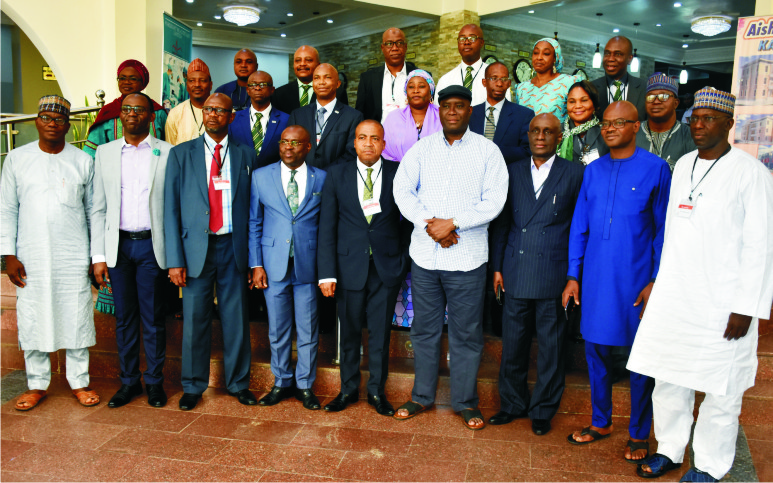Business
FG To Deliver FIDs On Four Projects …Approves $5.3bn For Ibadan – Kano Rail Project

The Federal Government has promised to deliver Final Investment Decisions (FIDs) on at least four key projects within the nation’s oil and gas industry by the end of last quarter of 2019.
President Muhammadu Buhari disclosed this during the ongoing 24th World Energy Congress (WEC) in Abu Dhabi, United Arab Emirates last Tuesday.
Buhari said his vision was to bequeath a vibrant petroleum industry that would guarantee long term strategic investments and prosperity for Nigerians.
“My plan is to ensure that during my tenure, four Final Investment Decisions (FIDs) are taken.
“I am sure that within the next quarter, we should be able to conclude on some of these FIDs so as to grow the industry,” he said.
The president identified gas development as part of government priority to fast-track the industrialisation drive of the country.
“As you are aware, we are focusing on the Ajaokuta-Kaduna-Kano (AKK) pipeline project which will address some of our power issues and encourage the setting up of local industries and businesses along different areas in Nigeria,” he said.
The president also shed more light on the imperative of rehabilitating the nation’s refineries, saying that it was unsustainable for Nigeria to continue to import petroleum products.
He said that while private investment in the refining sector was encouraged, government should focus more on the repair of its existing refineries.
“People are talking about modular refineries, we know that modular refineries are part of the solution but they can only be part of the solution and not the solution.
“So, we are going to try to encourage modular refineries but before that, we are going to really focus on repairing the existing refineries to ensure that we are back on stream very shortly.”
Describing crude oil theft as “intractable”, Buhari said government was looking at practicable solutions to the menace.
He said government was also looking at the issue of reducing the cost of production, through robust engagement with the International Oil Companies (IOCs) toward getting the best value for all stakeholders.
According to him, Nigeria needs to lend its voice to global energy fora as they remain some of the best platforms where major decisions that impact on the global energy landscape are taken.
Meanwhile, the Federal Government has approved 5.3 billion dollars for the Ibadan-Kano standard gauge rail project.
The Minister of Transportation, Mr Rotimi Amaechi disclosed this in a statement issued yesterday in Abuja by his media aide, Mr Israel Ibeleme after the 3rd Maritime Stakeholders Interactive Forum held in Lagos.
“Yesterday, we got approval to complete the 5.3billion dollar Ibadan to Kano rail project and we have also applied for funding to commence coastal rail for the Port-Harcourt to Warri segment,” he said.
Amaechi explained that the Minister of Transportation, State, Gbemisola Saraki, has been assigned the responsibilities of overseeing all the maritime agencies.
He will be focusing on the railway sector.
“In my first term as minister, I completely abandoned the maritime sector to the Heads of agencies.
“This time around that would not be happening again as I have instructed that the Minister of Transportation for State should personally supervise the maritime agencies, while I just oversee what is happening.
“There are two things that I have discussed with President Muhammadu Buhari that I will be focusing on in this second term as a minister and they are maritime security and the Single Window project.
“I have assured government that by the end of 2020, we should have the Single Window at our maritime sector.”
The Tide reports that President Muhammadu Buhari directed the establishment of the single window platform that would integrate all government agencies at all the entry points into the country to promote trade and boost security.
Transport
Automated Points Concession : FAAN Workers Gave 72hrs To Revise Decisions In PH

Transport
FAAN Announces Pick-Up Points for Go-Cashless Cards

Business
Fidelity Bank To Empower Women With Sustainable Entrepreneurship Skills, HAP2.0
-

 Politics3 days ago
Politics3 days agoSenate Urges Tinubu To Sack CAC Boss
-

 News3 days ago
News3 days agoAmend Constitution To Accommodate State Police, Tinubu Tells Senators
-

 News3 days ago
News3 days agoDisu Takes Over As New IGP …Declares Total War On Corruption, Impunity
-
Business3 days ago
President Tinubu Extends Raw Shea Nuts Export Ban To 2027
-
Business3 days ago
Crisis Response: EU-project Delivers New Vet. Clinic To Katsina Govt.
-
Business3 days ago
President Tinubu Approves Extension Ban On Raw Shea Nut Export
-
Sports3 days ago
NDG: Rivers Coach Appeal To NDDC In Talent Discovery
-
Business3 days ago
Fidelity Bank To Empower Women With Sustainable Entrepreneurship Skills, HAP2.0

